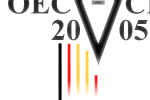| |
More categories

The goal of the
Parliamentary Debate Category is to encourage undergraduate engineering
students to present a well-reasoned viewpoint with a minimum of preparation
time. Engineers are often required to evaluate and argue for or against a
proposal on short notice. In this category, competitors defend or refute a
previously undisclosed resolution using the format of parliamentary style
debate.
Entrance Requirements
One (1) team per
school consisting of up to two (2) people are accepted into Parliamentary
Debate.
Category Format
Teams in
Parliamentary Debate are required to debate resolutions using the format of Parlimentary Style Debate
The resolutions
will be topics related to science, engineering, technology, education, or other
topics of direct interest to engineers and engineering students.
Each team will
debate at least four (4) times in the preliminary rounds.
Four teams will
proceed to the semi-final round. The semi-finalists will be four teams with the
highest total points awarded in the preliminary rounds. In the event that a tie
has to be broken, the placing will be determined as follows:
The highest
judge's score and lowest judge's score of the tied teams awarded during the
preliminary rounds will be deleted and the total points will be recalculated.
The team(s) with the corrected highest total points will be placed higher.
If the tie is
still not broken and the tied teams debated each other during the preliminary
rounds. The Government, during that debate, will be placed higher if they won
that debate.
If the tie is
still not broken, the tie will be broken by a coin toss.
The two teams
winning the semi-final round will proceed to the final debate.
Judging
The most
important aspects of evaluation in this category are argument and evidence,
refutation, organization and analysis, delivery, and ingenuity and wit.
Particular attention is given to the summaries presented at the end of the
debate. Each speaker on the team is graded out of a total of fifty (50) points
for a combined maximum total of one hundred (100) points. In the event of a
tie, the debate is awarded to the Government. The team scores will remain
confidential.
The marking
scheme for the Parliamentary Debate Category is as follows:
Argument and Evidence - 10 points
- Have the important points of the
resolution been sufficiently developed?
Refutation - 10 points
- Did the debater address points
brought up by the opponent?
Organization and Analysis - 10 points
- Were the arguments presented in an
ordered and logical manner?
Delivery - 10 points
- Was the speech clear and precise?
- Was the debater interesting and
entertaining?
Ingenuity and Wit - 10 points
- Did the debater have a unique style?
- Did the debater make appropriate use
of humor?
Debaters will be
penalized for any Points of Order or Privilege "well taken" against
them during the debate. The amount of the penalty is dependent on the severity
of the offense and is at the discretion of the judges.
If a team arrives
late to the debate, without a valid reason, their preparation time will be
reduced by the amount of time they are late. If they arrive after the scheduled
starting time of the speeches, without a valid reason, they will forfeit the
debate and automatically be assigned a loss. The debaters may present their
reason to the speaker of the house who will rule "valid reason", or
"invalid reason."
Awards
TBD
|
More categories








